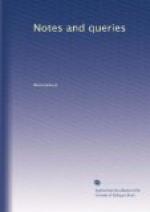His life has been published in an 8vo. volume, which was probably the work to which the “Note” of “MELANION” referred.
SELEUCUS.
Cheshire Round (No. 24. p. 383.).—A dance so called, peculiar to the county from whence it takes its name. The musical notes of the Cheshire Round may be seen in The Dancing Master, 1721, vol. i., and in Edward Jones’ Cheshire Melodies. It was sometimes danced “longways for as many us will” (as described in The Dancing Master), but more frequently by one person. A handbill of the time of William the Third states, “In Bartholomew Fair, at the Coach-House on the Pav’d stones at Hosier-Lane-End, you shall see a Black that dances the Cheshire Rounds to the admiration of all spectators.” Michael Root and John Sleepe, two clever caterers of “Bartlemy,” also advertise “a little boy that dances the Cheshire Round to perfection.” There is a portrait of Dogget the celebrated comedian (said to be the only one extant, but query if it is not Penkethman?), representing him dancing the Cheshire Round, with the motto “Ne sutor ultra crepidam.”
EDWARD F. RIMBAULT.
Horns to a River.—Why the poets give horns to rivers, must be sought for in the poet’s book, nature. I like the interpretation given by a glance up some sinuous and shelving valley, where the mighty stream, more than half lost to the eye, is only seen in one or two of its bolder reaches, as it tosses itself here to the right, and there to the left, to find a way for its mountain waters.
The third question about horns I am not able to answer. It would be interesting to know where your correspondent has found it in late Greek.
J.E.
Oxford, April 16. 1850.
Horns.—For answer to the third Query of “L.C.” (No. 24. p. 383.), I subscribe the following, from Coleridge:—
“Having quoted the passage from Shakspeare,
“’Take thou no scorn
To wear the horn, the lusty horn;
It was a crest ere thou wert born.”
As You Like It, Act iv. sc. 2.
“I question (he says), whether there exists a parallel instance of a phrase, that, like this of ‘Horns,’ is universal in all languages, and yet for which no one has discovered even a plausible origin.”—Literary Remains, vol. i. p. 120. Pickering, 1849.




